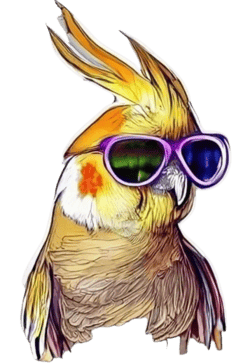The Real Deal: Can Cockatiels See in the Dark or Not?
There you are, having a late-night chat with your feathery friend when you suddenly wonder, “Can my Cockatiel even see me right now?” Well, let’s dig into the captivating world of Cockatiels and their sight in the dark, opening doors to avenues you perhaps never imagined!
Introduction
Yeah, we all know Cockatiels are cute, musical, and a joy to have around. But have you ever pondered how they perceive the world around them? It’s mind-boggling, isn’t it! Cueing the head-scratchers: Can Cockatiels see in the dark? Or do they feel as lost as we humans do without our trusty nightlight? Let’s fuel our fact-chasing brains and go on a detective’s journey to discover the real deal!
A Closer Look at Cockatiels
You can spot Cockatiels by their sunset-colored cheeks and fancy crowns. Originating from Down Under, Australia, these cuties make their homes in the outback. Imagine them, hopping and flitting about in the toasty Australian terrain. It’s like a scene straight out of a Pixar flick!
Now, onto bird vision. Birds, in general, are known to have visons that would put a high-definition TV to shame. But are Cockatiels part of this ultra-HD club?
The Science Behind Bird Vision and Nighttime Sight
If you’ve ever wondered, “Well, how does bird vision work?” you’re asking the right question! Basically, bird’s eye vision is all about rods and cones. Nope, not the kind you get at an ice-cream shop, we’re talking about photoreceptor cells. These cells play a huge part in decoding the mystery behind whether birds can see in the dark or not.
Cockatiels and Night Vision: Unveiling the Mystery
Let’s dive right into it. Cockatiels, like most birds, have more cone cells (color vision) than rod cells (night vision). So, they’re kinda like Picasso during the day … but helpless babes in the woods when the lights go out. In short, Cockatiels would need night-vision goggles just like we do!
Impact on Cockatiel Care: Understanding their Needs in the Dark
If you’re anything like me, now that you know Cockatiels can’t see well in the dark, you might start thinking about taking care of them when the sun’s gone down. Here’s where understanding their behavior kicks in.
When it’s lights out, Cockatiels instinctively sense it’s time to calm down – it’s not like they can start a party they can’t see, right? Hence, softer lighting conditions are ideal for bedtime. As for creating a safe space, you should “bird-proof” their surroundings – keep it free from hazards and provide them with peaceful, quiet space to roost.
Conclusion
So, what’s the verdict? Cockatiels, as it turns out, are not creatures of the night, contrary to what some might guess. Should we be throwing up a bunch of night lights for them? Probably not. Surprised? That’s what the journey of discovery is all about!
For more insights on nurturing a strong bond with your cockatiel, explore our guide on “How to Bond with a Cockatiel.” Discover tips and tricks to deepen your connection with your feathered companion.
FAQs
Can Cockatiels see better in the dark or in daylight?
Well, unless your Cockatiel is a hidden superhero with secret night-vision abilities, they definitely see better in daylight.
How can I ensure that my Cockatiel has a safe space at night?
Remember, they’re practically blind at night, so try making their surroundings simple, quiet, and hazard-free.
How does the ability or inability of Cockatiels to see at night affect their behavior?
It’s simple. Night translates to sleep for them. So, there’s no need to check your Cockatiel’s ‘party animal’ abilities post-dusk.
There you have it! The whole mystery of Cockatiels and nighttime vision laid out for you. Keep in mind, just because they can’t win a staring contest in the dark, doesn’t mean they won’t squawk loudly when you try to sneak in late at night! So, tread lightly.

About Me
I’m Kamran, a co-founder and content creator at cockatielhq.com. With 8+ years in the world of avian enthusiasts, I’ve gained extensive knowledge in caring for birds. From egg-laying and mating to cohabitation with other birds, dietary needs, nurturing, and breeding, I’m here at cockatielhq.com to share valuable insights for your avian companions.








One Comment